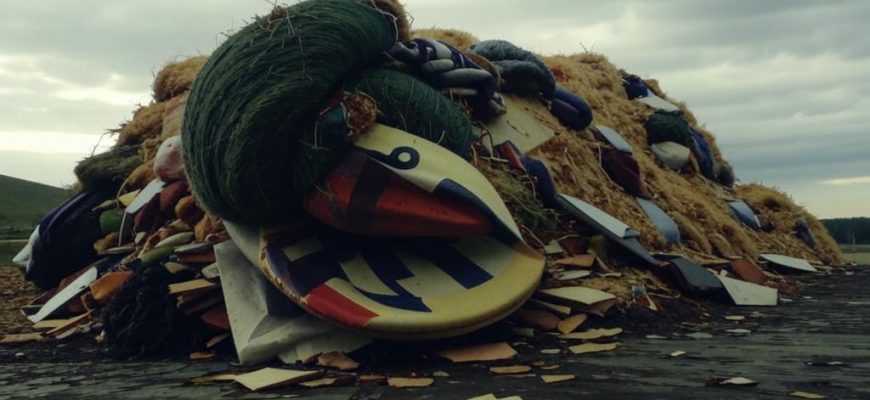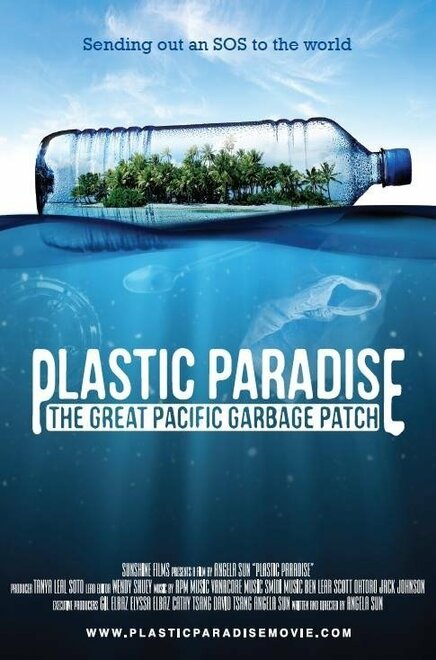Films about waste explore the impact of human consumption, overproduction, and environmental degradation. These films shed light on the consequences of our wasteful habits and highlight the urgent need for sustainable practices. Here are some existing films that tackle the topic of waste:
“Waste Land”, 2010
Director: Lucy Walker, Karen Harley, João Jardim

This documentary follows Brazilian artist Vik Muniz as he explores the largest landfill in the world, Jardim Gramacho. Muniz collaborates with the garbage pickers, creating stunning portraits using recycled materials while shedding light on the lives of those who work and live in the landfill.
Starring: Vik Muniz;
Production year: 2010;
Genre: documentary;
Age: 16+;
Duration: 99 min.;
Rating: IMDB: 7,8;
More information about the film “Waste Land” on the website imdb.com
“Plastic Paradise: The Great Pacific Garbage Patch”, 2013
Director: Angela Sun
This documentary delves into the devastating impact of plastic waste on the environment, particularly the Great Pacific Garbage Patch. Filmmaker Angela Sun uncovers the alarming truth about the enormous accumulation of plastic debris in our oceans and its effects on marine life.
Starring: Lewis Goldsmith, Wallace J. Nichols, Angela Sun;
Production year: 2013;
Genre: documentary, news, adventure, family;
Duration: 57 min.;
Rating: IMDB: 7,4;
“Trashed”, 2012
Director: Candida Brady
Actor Jeremy Irons takes viewers on a global journey to examine the issue of waste management and its consequences. From toxic landfills to polluted waterways, this documentary confronts the alarming reality of our wasteful habits and calls for immediate action.
Starring: Jeremy Irons, Paul Connett, Evangelos Kalafatis, Charles Moore, Clive Oxenden, Lynn Parker, Asif Rangoonwala;
Production year: 2012;
Genre: documentary;
Age: 12+;
Duration: 98 min.;
Rating: IMDB: 7,6;
“Garbage Dreams”, 2009
Director: Mai Iskander

Set in Egypt, this documentary focuses on the lives of three teenage boys who belong to a community of Zaballeen, or garbage collectors. The film provides an intimate look at their daily lives, their recycling efforts, and the challenges they face as their traditional way of life is threatened.
Starring: -;
Production year: 2009;
Genre: documentary;
Duration: 79 min.;
Rating: IMDB: 7,3;
More information about the film “Garbage Dreams” on the website imdb.com
“The True Cost”, 2015
Director: Andrew Morgan

Examining the environmental and social impact of the fast-fashion industry, this documentary highlights the wasteful practices and exploitative labor conditions involved in the production of cheap clothing. It encourages viewers to consider the true cost of their fashion choices.
Starring: Livia Giuggioli, Stella McCartney, Richard Wolff, Vandana Shiva, Rick Ridgeway, Lucy Siegle, Arif Jebtik, Rakesh Jaiswal, Orsola De Castro, Tim Kasser, Guido Brera, Sam Rainsy, Tansy Hoskins, Jagdisan Tiruvadi, Christina Dean, Satish Sinha, Mike Schragger, Shima Akhter, Kate Ball-Young, Barbara Briggs, John Hilary, Roger Lee, Safia Minney, Mu Sochua, Mowla Chowdhury, LaRhea Pepper, Pritpal Singh, Catherine Charlot, Mark Miller, Benjamin Powell;
Production year: 2015;
Genre: documentary, news, drama;
MPAA rating: pg13;
Duration: 93 min.;
Rating: IMDB: 7,7;
More information about the film “The True Cost” on the website imdb.com
These films offer thought-provoking perspectives on waste and its consequences, urging viewers to reevaluate their own behaviors and make more sustainable choices.
In conclusion, films that delve into the theme of waste serve as powerful reflections of our society's consumption habits and environmental negligence, often using compelling narratives to provoke thought and inspire change. From the haunting imagery of overflowing landfills in documentaries to the poignant character studies in fictional tales, these films challenge viewers to confront the consequences of our actions and consider the importance of sustainability. By weaving together artistic storytelling with urgent social commentary, these cinematic works not only entertain but also serve as catalysts for dialogue and action, encouraging us to rethink our relationship with waste and the planet.











